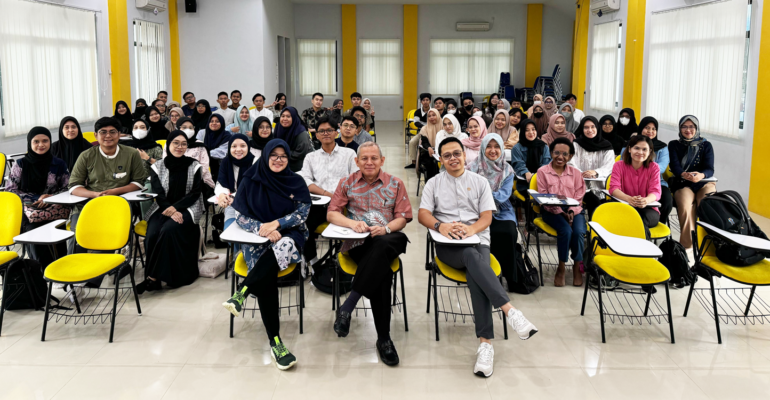The Halal Science Center (HSC) of IPB University Provides Technical Guidance for Establishing a Halal Center at Lambung Mangkurat University

The Halal Science Center (HSC) of IPB University, led by Prof Khaswar Syamsu, visited Lambung Mangkurat University (ULM) to deliver a public lecture on the role of universities in developing the halal ecosystem. His visit also included providing technical guidance and sharing experiences for the establishment of a halal center at ULM.
During the visit, Prof Khaswar explained that universities can conduct education and training to develop human resources in the field of halal. He mentioned that the HSC of IPB University conducts education through curriculum development for halal education and training.
Prof Khaswar cited collaborations with the Master’s Program in Logistics and Agromaritime at IPB University to develop a specialized Master’s program in Halal Industry Logistics. Additionally, the HSC of IPB University collaborates with various parties to conduct training for halal slaughterers and halal supervisors at various locations.
“We have conducted training for Halal Slaughterers and Halal Supervisors at Slaughterhouses in collaboration with Meat and Livestock Australia and the Jakarta Provincial Government since 2018. As of March 2024, the HSC of IPB University has trained more than 300 Halal Slaughterers,” he explained.
Moreover, the HSC of IPB University regularly conducts in-house training upon consumer requests, providing training for halal supervisors for various industries and external halal auditors for halal certification bodies.
“Until March 2024, the HSC of IPB University has trained nearly 600 halal supervisors from various companies and around 17 external halal auditors for halal certification bodies. As a follow-up to the training, we also provide technical guidance and consultation for planning and implementing Halal Product Assurance Systems (SJPH) and halal certification processes for industries,” he said.
Furthermore, Prof Khaswar explained that universities can conduct research related to the halal field. The outputs of halal-related research programs include not only undergraduate (S1) and postgraduate (S2 and S3) graduates but also scientific publications in reputable international journals.
“The HSC of IPB University has conducted research on methods for authenticating halal materials and products, innovation of new materials to substitute prohibited materials, and the development of halal certification and traceability systems based on artificial intelligence (AI) and blockchain. The research results have been published in various reputable international journals,” he elaborated.
Lastly, he emphasized the importance of community service in the halal field. He stated that universities can provide training and mentoring to assist Micro, Small, and Medium Enterprises (MSMEs) in the halal certification process.
“Universities, by involving faculty members in the Community Service Program and students, can act as accompanying institutions in the halal product process for MSMEs. Until March 2024, the HSC of IPB University has mentored nearly 2,000 MSMEs to obtain halal certification,” he concluded. (IAAS/Hap)



